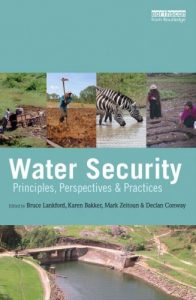Dunn, Gemma (ed.) (2012). Water Security Guidance Document. Vancouver, BC: UBC Program on Water Governance.
Author: michael ko
Water Security: Research Challenges and Opportunities. Science
Bakker, K. (2012). Water Security: Research Challenges and Opportunities. Science, 33(6097): 914-915. DOI: 10.1126/science.1226337
Water Security: Principles, Perspectives and Practices
 Water Security: Principles, Perspectives and Practices
Water Security: Principles, Perspectives and Practices
Edited by Bruce Lankford, Karen Bakker, Mark Zeitoun, Declan Conway
The purpose of this book is to present an overview of the latest research, policy, practitioner, academic and international thinking on water security—an issue that, like water governance a few years ago, has developed much policy awareness and momentum with a wide range of stakeholders. As a concept it is open to multiple interpretations, and the authors here set out the various approaches to the topic from different perspectives.
Key themes addressed include:
· Water security as a foreign policy issue
· The interconnected variables of water, food, and human security
· Dimensions other than military and international relations concerns around water security
· Water security theory and methods, tools and audits.
The book is loosely based on a masters level degree plus a short professional course on water security both given at the University of East Anglia, delivered by international authorities on their subjects. It should serve as an introductory textbook as well as be of value to professionals, NGOs, and policy-makers.
For more details see http://www.routledge.com/books/details/9780415534710/
Canadian Water Security Assessment Framework: Tools for Assessing Water Security and Improving Watershed Governance
Bakker, K. and Allen, D. (2015). Canadian Water Security Assessment Framework: Tools for Assessing Water Security and Improving Watershed Governance (End-User Report). Waterloo, ON: Canadian Water Network.
A comparative analysis of current microbial water quality risk assessment and management practices in British Columbia and Ontario, Canada
Dunn, G., Harris, L. Cook, C. and Prystajecky, N. (2014). A comparative analysis of current microbial water quality risk assessment and management practices in British Columbia and Ontario, Canada. Science of the Total Environment 468-469: 544-552.
The main findings of this research and insights for policy makers and practitioners are summarized in this policy brief.
Features of institutions and governance processes that enable efficient, effective and equitable water management
McFarlane, K., Harris, L. and Bakker, K. (2014). Features of institutions and governance processes that enable efficient, effective and equitable water management. Vancouver, BC: UBC Program on Water Governance.
Regional surface and groundwater management and governance study: Review of North American case studies
McFarlane, K., Harris, L. and Bakker, K. (2014). Regional surface and groundwater management and governance study: Review of North American case studies. Vancouver, BC: UBC Program on Water Governance.
Microbial risk governance: Challenges and opportunities in Canada
Dunn, G., Harris, L. and Bakker, K. (2015). Microbial risk governance: Challenges and opportunities in Canada. Canadian Water Resources Journal, 40(3): 237-249. [Open Access]
Indigenous water governance in British Columbia and Canada: Annotated bibliography
Simms, R. (2015). Indigenous water governance in British Columbia and Canada: Annotated bibliography. Vancouver, BC: UBC Program on Water Governance.
Navigating the tensions in collaborative watershed governance: Water governance and indigenous communities in British Columbia, Canada
Simms, R., Harris, L., Joe, N., and Bakker, K. (2016). Navigating the tensions in collaborative watershed governance: Water governance and indigenous communities in British Columbia, Canada. Geoforum, 73: 6-16.
An open access version of this article is available here.
